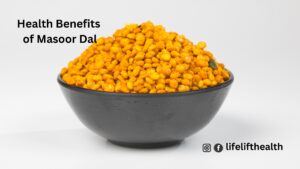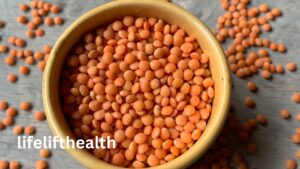Introduction
Masoor dal, also known as red lentils, is a staple in many households, particularly in South Asia. Known for its versatility, quick cooking time, and delicious taste, masoor dal is also a powerhouse of nutrition. Whether you’re a fitness enthusiast, a vegetarian, or someone seeking a healthy diet, incorporating masoor dal into your meals can provide a wealth of benefits. Here’s an in-depth look at its nutritional value and health advantages.
Nutritional Profile of Masoor Dal
Masoor dal is packed with essential nutrients that make it a valuable addition to a balanced diet. Below is the approximate nutritional composition of 100 grams of cooked masoor dal:
| Nutrient | Amount |
| Calories | 116 kcal |
| Protein | 9 grams |
| Carbohydrates | 20 grams |
| Dietary Fiber | 8 grams |
| Fat | 0.4 grams |
| Iron | 3.3 mg |
| Potassium | 369 mg |
| Folate (Vitamin B9) | 181 mcg |
| Vitamin B1 (Thiamine) | 0.3 mg |
| Magnesium | 36 mg |
-
Rich Source of Protein
Masoor dal is an excellent plant-based protein source, making it particularly beneficial for vegetarians and vegans. Protein is essential for muscle repair, immune function, and the production of enzymes and hormones.
-
High in Dietary Fiber
With its substantial fiber content, masoor dal aids in improving digestion, maintaining bowel regularity, and reducing cholesterol levels. This makes it a heart-friendly food that can help prevent cardiovascular diseases.
-
Low in Fat and Cholesterol-Free
Masoor dal is naturally low in fat and contains no cholesterol, making it ideal for individuals aiming to maintain a healthy weight or manage cholesterol levels.
-
Rich in Iron
Iron is crucial for producing hemoglobin, which transports oxygen throughout the body. Masoor dal’s iron content helps combat anemia and boosts energy levels, especially in women and children.
-
Packed with Folate
Folate (Vitamin B9) is essential for cell growth and the formation of DNA. It is particularly beneficial for pregnant women as it aids in fetal development and reduces the risk of neural tube defects.
-
Supports Heart Health
The combination of potassium and magnesium in masoor dal supports heart health by regulating blood pressure and preventing artery blockages.
-
Source of Antioxidants
Masoor dal contains antioxidants that combat free radicals, reducing oxidative stress and potentially lowering the risk of chronic diseases like cancer and diabetes.
Health Benefits of Masoor Dal
- Weight Management: The high fiber and protein content help in feeling full longer, reducing overeating.
- Diabetes Control: With a low glycemic index, masoor dal helps regulate blood sugar levels.
- Improved Immunity: The vitamins and minerals in masoor dal enhance immune system function.
- Bone Health: Its magnesium and calcium content contribute to stronger bones.
How to Include Masoor Dal in Your Diet
Masoor dal can be prepared in various ways:
- Dal Curry: A simple and flavorful dish with spices and herbs.
- Soups: Blended masoor dal adds creaminess and nutrition.
- Salads: Cooked masoor dal can be added to salads for extra protein.
- Snacks: Make crispy masoor dal fritters or patties.
Tips for Cooking Masoor Dal
Cooking masoor dal is straightforward and doesn’t require much time compared to other lentils. Here are some tips to get the best results:
- Rinse Thoroughly: Wash the lentils multiple times to remove dirt and debris.
- Soaking (Optional): Although not necessary, soaking masoor dal for 20-30 minutes can reduce cooking time and improve digestibility.
- Use Aromatics: Add ginger, garlic, or bay leaves while cooking to enhance the flavor.
- Pressure Cooker vs. Stove: Masoor dal cooks quickly in both methods. In a pressure cooker, it takes about 2-3 whistles, while on a stovetop, it may take 15-20 minutes.
- Tempering (Tadka): Finish the dish with tempered spices such as cumin, mustard seeds, and curry leaves for added aroma and taste.

Masoor Dal for Different Dietary Preferences
Masoor dal is incredibly versatile and can fit into a variety of diets:
- Vegan: Combine with coconut milk or vegetable stock for a creamy vegan dal.
- Gluten-Free: Naturally gluten-free, it’s perfect for those with gluten sensitivities or celiac disease.
- High-Protein Diet: Pair masoor dal with quinoa or brown rice to create a complete protein-rich meal.
Precautions and Considerations
While masoor dal is nutritious, here are some points to keep in mind:
- Portion Control: Overeating lentils can lead to bloating due to their high fiber content. Moderation is key.
- Cooking Thoroughly: Undercooked lentils may cause digestive discomfort. Ensure they are soft and fully cooked.
- Allergies: Though rare, some people might have legume allergies. Introduce masoor dal slowly if you’re new to it.

Masoor Dal in Traditional and Modern Cuisine
Masoor dal has been a part of traditional recipes across South Asia for centuries, featuring in dishes such as:
- Dal Tadka: A spiced lentil dish often served with rice or naan.
- Khichdi: A wholesome one-pot meal made with lentils, rice, and vegetables.
- Curries and Gravies: Masoor dal thickens and enriches various gravies.
In modern cuisine, chefs have started experimenting with masoor dal in:
- Burgers and Patties: Cooked dal mixed with spices and breadcrumbs for vegetarian burgers.
- Soups and Stews: A nutrient-packed addition to global recipes.
- Lentil Flour: Ground masoor dal can be used in gluten-free baking.
Environmental Benefits of Masoor Dal
Masoor dal is not only good for your health but also for the planet. Lentils are environmentally friendly:
- Low Water Footprint: They require significantly less water to grow compared to animal protein.
- Nitrogen Fixation: Lentil plants naturally enrich the soil by fixing nitrogen, reducing the need for chemical fertilizers.
- Sustainable Protein: A great alternative to meat, reducing greenhouse gas emissions associated with livestock farming.
Conclusion
Masoor dal is a small lentil with immense benefits. It’s a cornerstone of nutritious diets, offering a rich source of protein, vitamins, and minerals. Its versatility in recipes, quick cooking time, and health-promoting properties make it an essential part of any kitchen.
Whether you enjoy it as a humble dal curry or use it creatively in modern dishes, masoor dal proves to be a superfood that contributes to both personal well-being and environmental sustainability.
Incorporate this vibrant red lentil into your diet today and reap the rewards of its incredible nutritional profile!
FAQs
Q1: Is masoor dal good for weight loss?
A: Yes, masoor dal is excellent for weight loss. It is low in calories and fat, high in protein, and rich in dietary fiber, which helps you feel full for longer, reducing the tendency to overeat.
Q2: Can diabetics eat masoor dal?
A: Absolutely. Masoor dal has a low glycemic index, meaning it releases sugar slowly into the bloodstream, helping to regulate blood sugar levels. It is a diabetic-friendly food.
Q3: Is masoor dal a complete protein?
A: While masoor dal is rich in protein, it is not a complete protein because it lacks certain essential amino acids like methionine. Pairing it with rice, quinoa, or whole wheat can create a complete protein meal.
Q4: Is masoor dal safe during pregnancy?
A: Yes, masoor dal is highly beneficial during pregnancy. It is rich in folate, which is essential for fetal development and helps prevent neural tube defects. Its iron content also supports increased blood production during pregnancy.
Q5: Can masoor dal be eaten daily?
A: Yes, masoor dal can be included in daily meals as it is packed with essential nutrients. However, moderation is key to avoid digestive issues, and it’s advisable to rotate it with other lentils for a balanced diet.
Q6: Is masoor dal gluten-free?
A: Yes, masoor dal is naturally gluten-free, making it suitable for individuals with gluten intolerance or celiac disease.
Q7: Does masoor dal cause gas or bloating?
A: Like most legumes, masoor dal contains complex carbohydrates that can cause gas or bloating in some individuals. Proper soaking, thorough rinsing, and cooking with digestive spices like cumin or ginger can help minimize this effect.
Q8: How much protein is in masoor dal?
A: Cooked masoor dal provides approximately 9 grams of protein per 100 grams, making it a valuable plant-based protein source.
Q9: Is masoor dal good for heart health?
A: Yes, masoor dal is heart-friendly due to its high fiber content, low fat, and presence of potassium and magnesium, which help regulate blood pressure and cholesterol levels.
Q10: What is the difference between whole masoor dal and split masoor dal?
A: Whole masoor dal has its outer skin intact and appears brown, while split masoor dal (red lentils) has the skin removed, giving it a reddish-orange color. Both have similar nutritional benefits, but split masoor dal cooks faster and has a milder taste.
Q11: How should masoor dal be stored?
A: Store masoor dal in an airtight container in a cool, dry place to maintain its freshness. Avoid exposure to moisture or direct sunlight to prevent spoilage.
Q12: Can masoor dal be consumed raw?
A: No, masoor dal should not be consumed raw as it contains anti-nutrients that can interfere with digestion. Cooking or sprouting neutralizes these compounds and makes it safe and nutritious to eat.
Q13: Is masoor dal suitable for children?
A: Yes, masoor dal is a nutritious food for children. It provides essential vitamins and minerals that support growth and development. Ensure it is well-cooked and mildly seasoned for easier digestion.
Q14: Can I freeze cooked masoor dal?
A: Yes, cooked masoor dal can be frozen in airtight containers or freezer-safe bags. It stays fresh for up to 3 months in the freezer, making it a convenient meal prep option.
Q15: Are there any side effects of masoor dal?
A: Masoor dal is generally safe for most people. However, excessive consumption may cause digestive discomfort or bloating due to its high fiber content. People with legume allergies should consult a doctor before consuming it.


